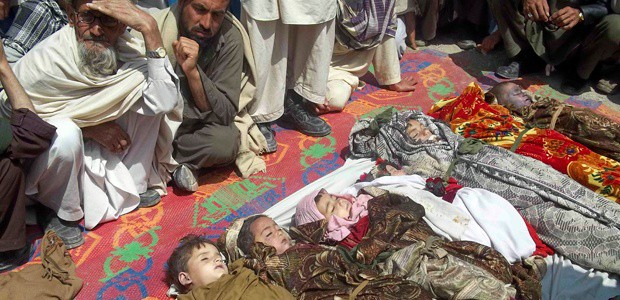When the Brown University (USA) based Costs of War project had estimated the direct deaths resulting from violence (actual fighting, bombing etc.) caused by the USA’s post 9/11 ‘War on Terror’ at about 920,000 (a little less than a million, or 0.9 million) then many people were shocked by this. However even at that time the project researchers had cautioned that this was merely the number of deaths which were directly caused in the conflicts. They had added that if all the indirect deaths related to the war on terror are also counted (for example deaths caused later by diseases resulting from destruction of sanitation and health facilities in the bombings), then the number of these deaths may turn out to be much higher, in fact it may be several times more.
Now, in mid-May, this project has also released its estimates of the indirect deaths caused in the War on Terror. These indirectly caused deaths have been estimated at 3.6 to 3.7 million. If these are added to the direct deaths caused earlier, the total number of deaths in the War on Terror goes up to 4.5 million to 4.6 million. So the total number of deaths is about 5 times the number of direct deaths.
The details of reaching this estimate have been provided in a thoroughly researched and thickly referenced paper meaningfully titled ‘How Death Outlives War—the Reverberating Impact of the Post 9/11 Wars on Human Health’. This important paper written by Stephanie Savell is on the one hand a confirmation of past trends (such as in the Korean War) that indirect death continue long after the actual war and can be much higher than the immediate war deaths, and on the other hand this is also very important from the point of view of an assessment of the costs of war which is close to reality in the context of recent wars. Hence this study is of great importance for peace activists and movements all over the world for taking their message of promoting peace and opposing wars among more and more people.
While this study states clearly that the total death toll in the post 9/11 war zones of Afghanistan, Pakistan, Iraq, Syria and Yemen could be at least 4.5 million to 4.6 million, it also says that so many aspects of life are affected by war that very precise estimates may not be possible to obtain and even these estimates are presented in a situation of still counting. As the number of serious malnourished children affected by ‘wasting’ is reported to be very high in these countries, hunger and deprivation are widespread, the tragedy is still continuing.
While the main estimate appears to be concentrated on the five countries mentioned above, the tragic situation in some other countries like Somalia and Libya has also been discussed in this report. In the context of Somalia in particular it is also mentioned that in view of the serious famine-like conditions prevailing here, the counter-terrorism laws could also have adversely affected the relief efforts badly needed by starving people.
An important point made by the study is that while war-devastated countries may lose much of the attention of the world and ‘the international community’ once the actual fighting ends, in many contexts the longer-term effects of war continue to cause more and more deaths, disabilities and distress. What is more, these deaths may even increase with the passage of time. In the case of Iraq, the number of children facing birth defects and disabilities may be very high, although this has been denied by others. There are several such examples of the longer-term health hazards of several extremely dangerous weapons, bombs and ammunitions.
In the contexts of several victim countries but perhaps most clearly in the context of Iraq, there appears to be a very strong case of a very large number of entirely avoidable deaths of entirely innocent persons having been caused, and of other large numbers of entirely innocent people having been exposed to very painful injuries, disabilities and diseases. Hence there is a very strong justice based case for damages in billions of dollars being paid by the main perpetrators of violence to the victims. This process can start by the USA and Britain in particular making these payments to the victims and their families in Iraq, and this can later be extended to other victim countries wherever a strong case for this exists. Such payments cannot undo the great tragedy, the entirely avoidable tragedy of such great distress having been caused to entirely innocent persons just due to the whims and faulty decision making of a small bunch of arrogant persons in positions of powers, but this can help to reduce their distress even if only partially and belatedly. This is the least that can be done at this late stage.
 Eurasia Press & News
Eurasia Press & News




